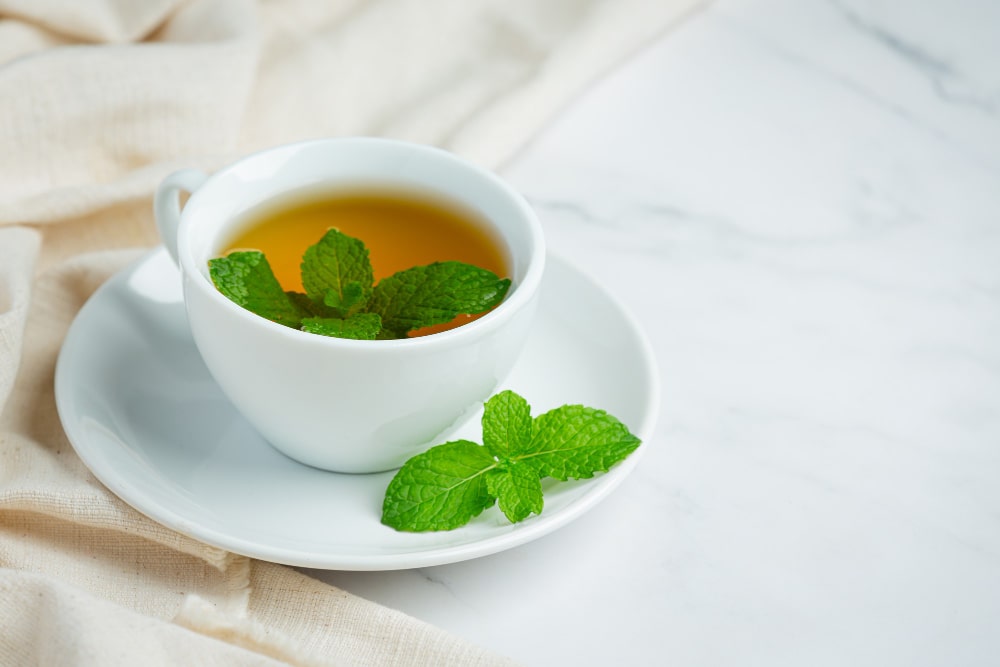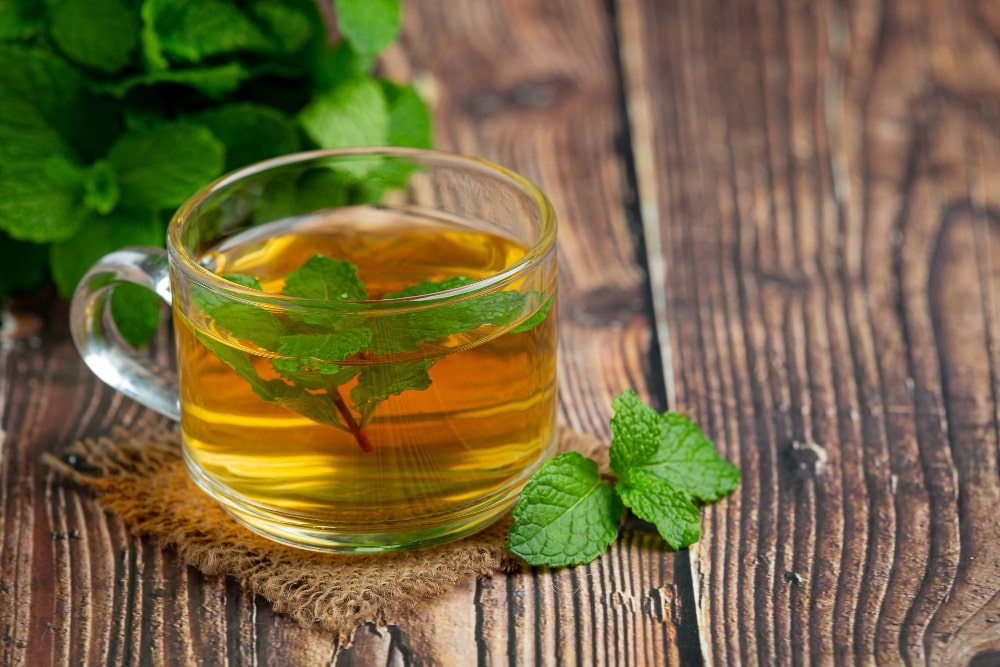The realm of teas is remarkably extensive, encompassing rich black teas, soft green teas, and everything in between. Amid these vast choices, spearmint tea often misses our attention, but it decidedly deserves recognition. Spearmint tea is not just a distinctively flavored brew, it also claims multiple potential health benefits. In this article, you will discover these benefits and understand why drinking spearmint tea should be a part of your daily routine.
What is spearmint tea?
Spearmint tea is a type of herbal tea, brewed by infusing spearmint plant leaves (Mentha spicata). Native to Asia and Europe, this plant possesses a universally admired rejuvenating flavor. Moreover, it channels a substantial number of antioxidant substances to the tea, including rosmarinic acid along with flavonoids like limonene and menthol.
Read More: The 5 Best Teas for Headaches to Relief Pain Naturally
Recipe for Homemade spearmint tea:
Crafting spearmint tea at your home is rather straightforward and requires minimal
Ingredients. All you need is:
- Fresh spearmint leaves: Approx 1 tablespoon for each cup of water
- Water
Here are the steps you should follow:
- Initiate the process by boiling the water in a kettle or a pot.
- Concurrently, cleanse your spearmint leaves with cold water to remove any dirt or unwanted particles.
- Once the water starts bubbling, remove it from the burner and let it lessen in heat for a minute or two.
- Place the cleaned spearmint leaves in a teapot or any container that isn’t impacted by heat.
- Over the leaves, pour the heated water, cover the pot, and allow the tea to steep. Steeping ensures that the water absorbs the nuanced flavors of the spearmint leaves. Typically, you’d steep spearmint tea for about 5-10 minutes, but the time can adjust as per your taste preference.
- After the tea steeping process is over, pour it through a strainer into a teacup or a mug to separate the leaves. You can choose to keep the leaves if you prefer the visual appeal or desire a stronger flavor.
- Give the tea a bit of time to cool until it reaches a comfortable temperature.
- You are now ready to enjoy your freshly brewed spearmint tea just like that, or for a touch of variety, you can include sweeteners like honey or add a lemon slice.
Enjoy your refreshing homemade spearmint tea!

Read More: Best Tea for Colds, Flu, Cough: Benefits, Treatment
Benefits of Spearmint Tea
Here are the Top 9 benefits of spearmint tea include;
1) Boasts Strong Antioxidants:
Spearmint tea is fully packed with antioxidants. These are substances that help combat damage-causing particles in our bodies known as free radicals. When uncontrolled, these particles can lead to certain serious health issues, such as heart disease, diabetes, and cancer. Antioxidants like rosmarinic acid, limonene, and menthol found in spearmint play a significant role in combating this damage.
2) Helps with Digestive Upsets:
Spearmint has been utilized historically to alleviate symptoms of indigestion, nausea, vomiting, gas, and bloating putatively due to its significant compound (-)-carvone. This naturally found compound inhibits muscle contractions in the digestive tract, which contributes to its soothing effect on the digestive system.
3) Aides Women with Hormone Imbalances:
Studies suggest that spearmint tea may influence hormonal balances in women positively. It has shown potential in decreasing male hormones like testosterone while increasing hormones crucial for ovulation, such as luteinizing hormone (LH), follicle-stimulating hormone (FSH), and estradiol.
Read More: Is Watermelon Good for Diabetes?
4) Reduces Facial Hair in Women:
Distinctively, spearmint tea may also help combat hirsutism – the growth of dark, coarse hair on the face, chest, and abdomen in women. This is often linked to high levels of male hormones. Some studies highlighted that women drinking two cups of spearmint tea daily have reportedly noted a reduction in facial hair growth.
5) Boosts Memory:
Emerging research suggests that spearmint tea may benefit memory. A few studies have indicated that supplementation with spearmint extract showed a considerable improvement in learning, memory, and even sleep quality.
6) Fights Bacterial Infections:
Spearmint possesses potent antibacterial and antimicrobial properties, lending its efficacy as a natural remedy against several types of harmful bacteria that can cause bad breath and oral infections. It’s a prevalent aspect of mouthwash, toothpaste, and chewing gums for more than just its minty flavor profile.
7) Reduces Stress and Induces Sleep:
In parts of South America, spearmint tea is famous for its calming effect and is often consumed to reduce stress and provide a good night’s sleep. In a few studies, spearmint extract has been shown to decrease anxiety. It suggests that spearmint aids relaxation by interacting with GABA receptors in the brain.
Read More: Pineapple Juice for Cough Relief: The Ultimate Guide
8) Alleviates Arthritis Pain:
Research indicates drinking spearmint tea might potentially be a natural remedy for arthritis pain. A broader review of human and animal studies concluded that essential oils from spearmint had pain-relieving effects.
9) Balances Blood Pressure:
Although human studies regarding spearmint tea’s impact on blood pressure are scant, some scientific evidence suggests it may be beneficial. The compound (-)-carvone in spearmint has been shown to act similarly to calcium-channel blockers, which are often used to treat high blood pressure.
Conclusion
In conclusion, spearmint tea could be a great addition to your daily diet due to its potential health advantages, which are supported by both long-standing traditional use and an increasing amount of scientific studies. But remember, it’s always recommended that you talk to a health expert before making significant alterations to your health routine.
Read More: 10 best Heart Healthy Snacks: Recipes, Ideas and Tips
Frequently Asked Questions
Does spearmint tea have any caffeine?
No, spearmint tea is caffeine-free. It’s an herbal tea and unlike black or green teas, which come from the Camellia sinensis plant and carry caffeine, spearmint tea naturally has zero caffeine. So, if you’re aiming to cut down your caffeine intake, it’s an excellent pick.
Is spearmint tea safe for pregnant women to drink?
Generally, spearmint tea is safe for use during pregnancy but it’s important to only consume in moderation. But as always, it’s best to consult with your healthcare provider before consuming any herbal teas during pregnancy, as excessive consumption could lead to potential issues.
What role does spearmint tea play in reducing inflammation?
Spearmint tea possesses anti-inflammatory properties largely attributed to rosmarinic acid, a compound naturally found in spearmint. Inflammation is your body’s protective response to injury or damage, and it helps to heal the affected tissue. However, chronic inflammation can lead to various health problems. By reducing inflammation, spearmint tea helps combat these potential issues. In particular, some research has suggested its potential in alleviating arthritis pain, although further studies are needed for definitive conclusions.

